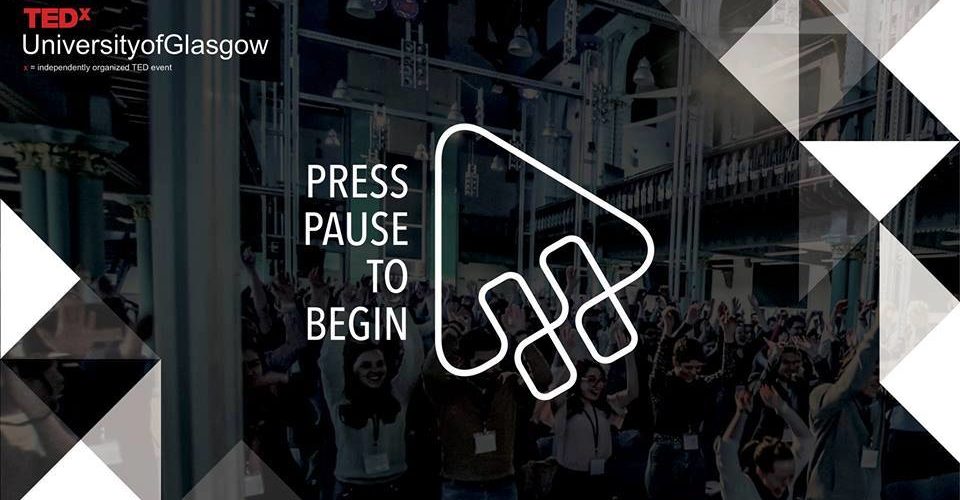TEDxUofG 2018: Press Pause to Begin

Despite the need to reschedule around unprecedented snow, spirits were high as the conference began. An inventive introduction from one of last year’s speakers, Lovisa, recalled a few of the common themes I associate with TEDx: challenges, fun, new perspectives, wit, and self-awareness. If her speech wasn’t enough to hook people, the background music won the hearts of Frozen fans, making light of what must have been a stressful period of re-organisation following the shutdown earlier in March.
Let’s begin with Hussein El-Ajouz’ talk on paying attention to ourselves, and resisting the urge to “slide to unlock”. Hussein outlined the numb state of mind that constant Snapchat, Facebook, and Instagram checking left him in, feeling out of control of his own identity. Hussein addressed the theme ‘Press Pause to Begin’ by asking us to pause and ponder this question, “Who really defines you and your interests?” For him, pressing pause to begin was all about taking action to be more aware of your day-to-day activities. He urged everyone to respect the moments we have alone to ourselves; to reflect, daydream, or consider how to reboot our personal goals.
One woman who is reaching for a better sense of her personal goals is Vicky Brock. A powerful figure in data analytics, Vicky’s talk focused on the “involuntary pause” in her career. She was forced out of the CEO position in the company that she founded, and described how her power, direction and identity felt stripped from her. Vicky’s talk taught us to embrace the neutral zone (that space between losing a career and finding your new job or passion), even though it can be frightening. A fellow entrepreneur helped her to make the most of her “gardening leave”, in which she could rebuild without rush or deadline into the person she is today. Vicky found a new beginning in her pause, and advised that we all try our best to live in and understand those moments in life. However, preparing for the worst is pointless, and Vicky warned us not to miss the good experiences. Vicky’s talk invites us to shift our outlook and see that such transitions can lead to great things.
Questioning the uniqueness of identity, Professor Kevin O’Dell delved into human genetics. He demonstrated that despite a hundred or so “errors” in each of our genetic sequencing, humans across the world are all extremely similar. We all begin from the same general process of genetic sequencing, and Kevin pressed pause on our perceived differences to emphasise that, by nature, we are more closely related than we think. Culture, environment and experiences are the main influences distinguishing people. When our environment changes our genetic make up, it can be difficult to draw a line between the overlapping influences of nature and nurture.
Far removed from human biology, Frank Quitely’s work involves depicting fictional worlds which readers can hopefully relate to on some level, if not get lost in. Frank Quitely illustrated how comic books can play with pace in an exceptional way, sharing the creative process to show us how comics can provide new perspectives to stories. Where a film or TV programme would present a sequence of actions in one way, with the sound, image, motion and script; the detailed images of comics can often provide many different narratives to one tale. In this way, the graphic design endows readers control of the story, allowing our perspective to follow the art as we see it. From basic scenery to the intricate details all contribute in enhancing each person’s unique interpretation of the narrative. The next speaker brought us back to reality with her talk discussing how we deal with anxieties and distress.
From catchy advert jingles to study motivation and beyond, the extensive impact of sound on our daily lives is something we take for granted, such that we may not recognise that it can affect our emotional resilience. Common sounds can become associated with negative experiences and alter your reaction in future situations. You could snap in anger at a friend loudly closing a car door, when what’s bothering you may be the memory of a previous argument which ended with a similar door slam. Unresolved anxiety coupled to a sound can sensitise an individual to react negatively in situations which may not otherwise trouble them. Jessica Argo, a 3D Sound Designer intimated that sometimes the pauses we take to relax are not truly beneficial in the long term. Her research around the power of sound to induce emotional reactions, presents a meditative process resulting from temporary discomfort. Opening with a trigger warning for those with PTSD, the talk included stress inducing sounds, drawing a powerful emotional response. Jessica argued that the apparent benefits of music often act as a distraction but that this could potentially lead to catastrophising the anxiety. By playing soft, soothing sounds, or upbeat music to “cheer ourselves up”, we could be suppressing the problem, which instead needs to be deeply understood. Using sound design, Jessica hopes to improve education on anxiety and “emotional immersion”, encouraging people to tune into the noise, however daunting it appears.
Ever look in the mirror and just want to crawl back under a duvet where your flaws are hidden from everyone, including yourself? This negative reaction to our reflection is something which Kay Davidson describes as “mirror mouth” in her talk, which promotes a shift in perspective to one of positivity. Kay, a fashion designer and stylist, prompted us to instead direct our focus to points which we like. Be it ensuring your tattoo is on show, wearing your favourite colour, or being proud of the sustainable clothing you have chosen; your reflection should spread a smile across your face. “Fast fashion” trends that come and go, and suspiciously cheap clothes have benefitted an industry that creates insecurities and sells hope through clothing. “Hoping to find a new job? Well, we have the blazer for you to follow your career goals – never mind the employees on less than minimum wage attaching the buttons”. Kay’s talk stressed not only shifting our personal perspective, but also the consumer perspective. Next time you are trying clothes on at a shop, pause to think how choosing a sustainable brand could perk up your mirror mouth.
Self-consciousness is a problem we all deal with, unlike spinal cord injuries which many of us are lucky to have avoided. These injuries can lead to overheating, and entrepreneur Corien Staels was inspired by her university supervisor’s frustration to address this problem. Sweating is controlled by the spinal cord, and injuries can not only lead to loss of leg movement, but also loss of the ability to control sweat1 . Without this, exercising and being in the sun or cold for too long can become dangerous, as regulation of temperature is very difficult. While more extreme problems can arise for wheelchair athletes, Corien steered us to simply reflect upon how challenging overheating would be. This challenge may be overcome by the new wheelchair cushion developed by Corien, dedicated to reducing transport struggles and temperature issues. WheelAIR, a battery-powered backrest, addresses this problem with its carefully designed materials and the blowing of cool air onto the user’s back. Refusing to begin with restriction or a resigned attitude, Corien reminded the audience that “when you put the focus on ability so much more becomes available.”
Sharing this proactive outlook, Ndeye Borso Tall conveyed her message through old tales and personal experiences from West Africa. A social worker and activist, Tall’s stories captivated the room as she spoke about finding what matters to you and never giving up. She shared stories of strong women who fought, who won, and who sacrificed their lives rather than be enslaved. Acknowledging the education she was lucky enough to receive is not available equally across West Africa, Tall’s passion to improve education and opportunities for all through empowering young people is inspiring. She has started a club called Young Advocates for Human Rights and strongly believes that we can all change the narrative around education for women and young people, especially through teaching human rights in schools. Through her work, she discovered that sometimes the basics (shoes, clothes etc.) are not primarily what children need; yes, these are important, but so too are support and providing the right context for growth and learning.
This year the TEDxUofG team encouraged audience members to actively make the most of the day, with a checklist of challenges and suggestions some of which were included in the day’s talks. In the interval, we could visit different stands showcasing virtual reality and therapets. A final musical performance by the talented and funny Age-Otori put smiles on faces, before closing remarks wrapped up another excellent conference by recognising those whose dedication helped bring everything together.
Returning to the struggle experienced during the snow shutdown, the whole TEDxUofG team had paused together, and discussed potential routes. Hearing about each person’s passion and drive to continue with the conference despite other commitments and inevitable cancellations reminded us of the huge amount of work and inspiration surrounding TEDx events. A few familiar faces confirmed that this is an especially welcoming environment. Brilliant speakers make you want to return each year, and organisers are willing to plough through unexpected barriers to ensure no pause prevents the event from going forward.










